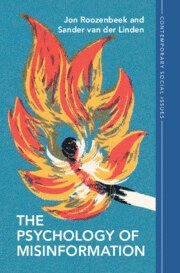
Fler böcker inom
- Format
- Inbunden (Hardback)
- Språk
- Engelska
- Serie
- Contemporary Social Issues Series
- Utgivningsdatum
- 2024-04-04
- Förlag
- Cambridge University Press
- Medarbetare
- Linden, Sander van der (förf.)
- Dimensioner
- 229 x 152 x 13 mm
- Vikt
- ISBN
- 9781009214407
- 431 g
Psychology of Misinformation
Inbunden,
Engelska, 2024-04-04
1066
- Skickas från oss inom 7-10 vardagar.
- Fri frakt över 249 kr för privatkunder i Sverige.
Finns även som
Passar bra ihop
De som köpt den här boken har ofta också köpt Let Them Theory av Mel Robbins (inbunden).
Köp båda 2 för 1370 krKundrecensioner
Har du läst boken?
Sätt ditt betyg »
Fler böcker av författarna
-
Foolproof
Sander Van Der Linden, Sander Van Der Linden
-
Propaganda and Ideology in the Russian-Ukrainian War
Jon Roozenbeek, Jon Roozenbeek
-
Risk and Uncertainty in a Post-Truth Society
Sander Van Der Linden, Ragnar E Löfstedt, Ragnar E Lofstedt, Sander Van Der Linden, Sander Van Der Linden
Övrig information
Jon Roozenbeek is an award-winning researcher from the University of Cambridge, whose work straddles psychology, area studies, and computer science. He studies the psychology of misinformation and group identity in times of conflict, and authored Propaganda and Ideology in the Russian-Ukrainian War (2024). Sander van der Linden is Professor of Social Psychology in Society and Director of the Cambridge Social Decision-Making Lab at the University of Cambridge. He is ranked among the top 1% of highly cited social scientists worldwide.
Du kanske gillar
-
Waterlog
Roger Deakin
Häftad -
Peak Human
Johan Norberg
Inbunden -
Peak Human
Johan Norberg
Häftad -
Atomic Habits
James Clear
Trade paperback (UK)


